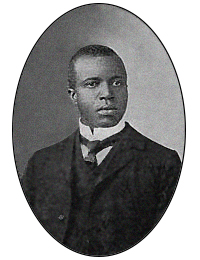|
| This is my post from this week's Tuesday Blog. |
This month has five Tuesdays and, as luck would have it, I happen to have some spare material to share. So here's the first of a two-part series, for your listening pleasure.
This week's installment of Once Upon the Internet brings in music from two source sites: the old MP3.COM and an Italian public domain site that is no longer active, vitaminc.it.
Back in the day, I amassed quite a few tracks from the piano music of the great African-American composer Scott Joplin, performed by a pair of (amateur?) pianists, Robert Daria and Dario Ronchi.
Ragtime is a musical genre that enjoyed its peak popularity between 1895 and 1918. Its cardinal trait is its syncopated, or "ragged", rhythm which takes me back to single-reel silent movies or Prohibition-era speakeasies. Scott Joplin became famous through the publication of the "Maple Leaf Rag" (1899) and a string of ragtime hits, although he was later forgotten by all but a small, dedicated community of ragtime aficionados until the major ragtime revival in the early 1970s – spurred in part by New England Conservatory president Gunther Schuller, and Hollywood director George Roy Hill.
The MP3.COM verbiage, as I recall, claimed that the performances adhered strictly to the tempo indications. To my ear, that seems a bit hard to accept, as it is rather customary to treat “Allegro” differently in musical tradition X from that of musical tradition Y, simply because composers of a given tradition may view “fast” as others may view it as “faster still”.

Ragtime, unlike the minuet or the waltz, doesn’t strictly adhere to a metric pattern. Wikipedia points out that “it is rather a musical genre that uses an effect that can be applied to any meter. The defining characteristic of ragtime music is a specific type of syncopation in which melodic accents occur between metrical beats.” Joplin, known as the "King of Ragtime", called the effect "weird and intoxicating." He also used the term "swing" in describing how to play ragtime music: "Play slowly until you catch the swing..." The name swing later came to be applied to an early genre of jazz that developed from ragtime.
I own other recordings of these little gems, notably a CD recorded by jazz pianist Dick Hyman and (yes by “the”) James Levine, and the tempo they adopt is night and day compared to Ronchi/Daria: break-neck speed vs cautious restraint.
Today’s musical share includes 21 tracks - the Daria tracks appear to have been recorded using an electronic piano made to "sound" rickety. I find that a bit annoying at times, but he does perform less kn own tracks - waltzes, marches and two-steps - I hadn't heard much before. The Ronchi tracks are recorded on a regular acoustic piano, and have a crisper sound quality..
A lot like I did with Kirkpatrick’s recording of the Scarlatti sonatas a couple of years ago, for the sake of disclosure, I wanted to provide a clear warning about overindulging on these. Maybe it’s the recording quality (poor to fair, generally) or just the style, but this stuff can give you a tummy ache if you’re not careful. Pace yourselves!
Scott JOPLIN (ca. 1868–1917)
- Bethena. A Concert Waltz (1905)
- Binks Waltz (1905)
- Leola. Two Step (1905)
- Rosebud. Two-Step (1905)
- Antoinette. March and Two-Step (1906)
- Reflection Rag (ca. 1907)
- The Nonpareil. A Rag & Two Step (1907)
- Pine Apple Rag (1908)
- School of Ragtime: Exercises (1908)
- Pleasant Moments. Rag-Time Waltz (1909)
- The Augustan Club Waltz (1901)
- Cleopha. March and Two Step (1902)
- The Crush Collision March (1896)
- The Favorite. Ragtime Two Step (1904)
- The Harmony Club Waltz (1896)
- The "Rag Time Dance" (1902)
Robert Daria, piano (Downloaded from MP3.COM)
- A Real Slow Drag (1911, Treemonisha:Act 3, no. 9)
- Gladiolus Rag (1907)
- I Want to See My Child (1911, Treemonisha:Act 3, no. 2)
- Rose Leaf Rag (1907)
- Searchlight Rag (1907)
Dario Ronchi, piano (Downloaded from vitaminic.it)

No comments:
Post a Comment